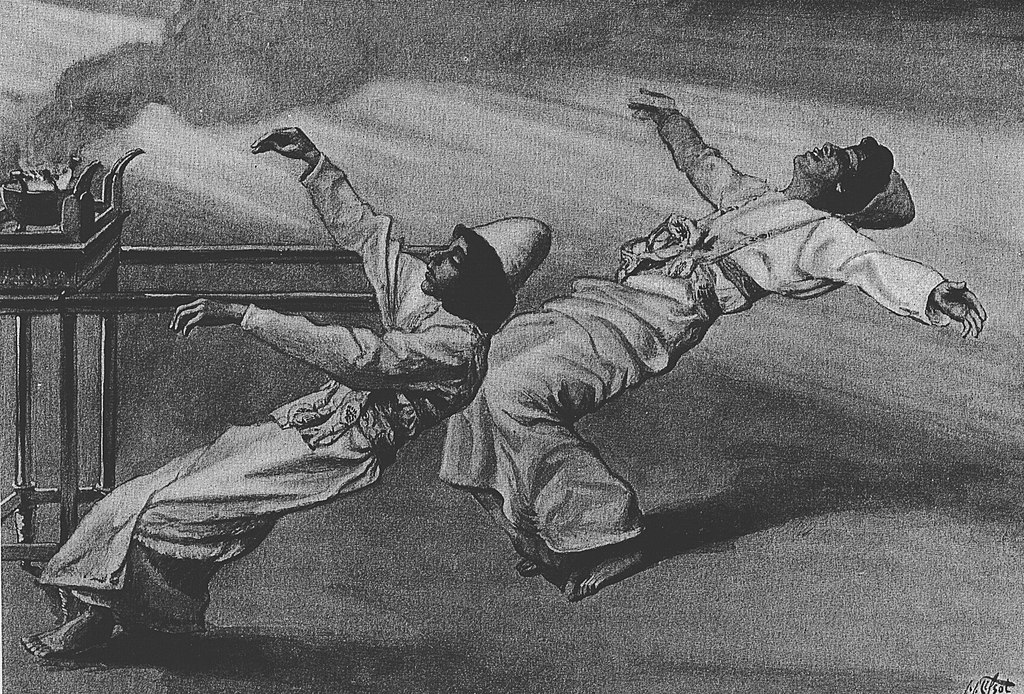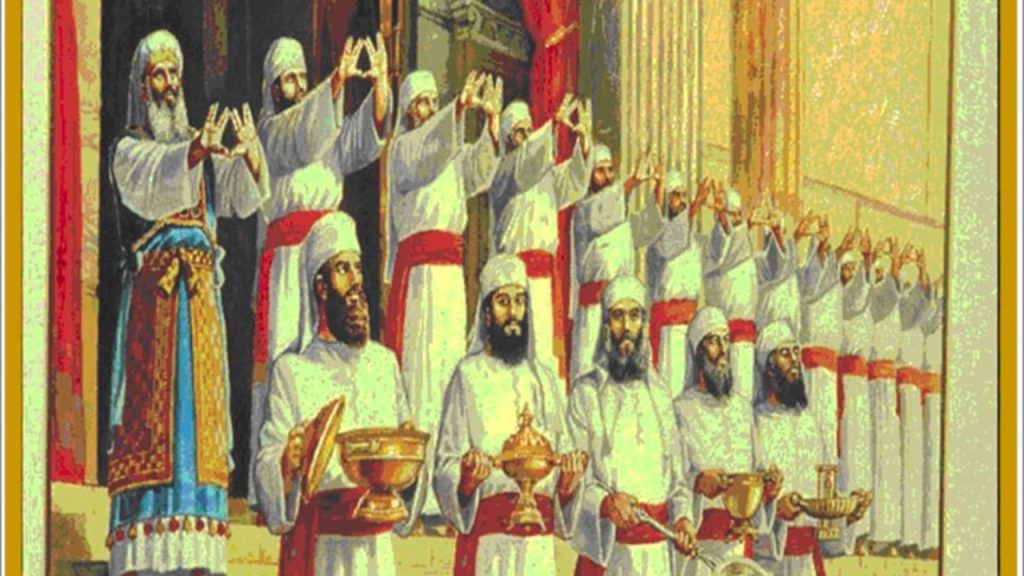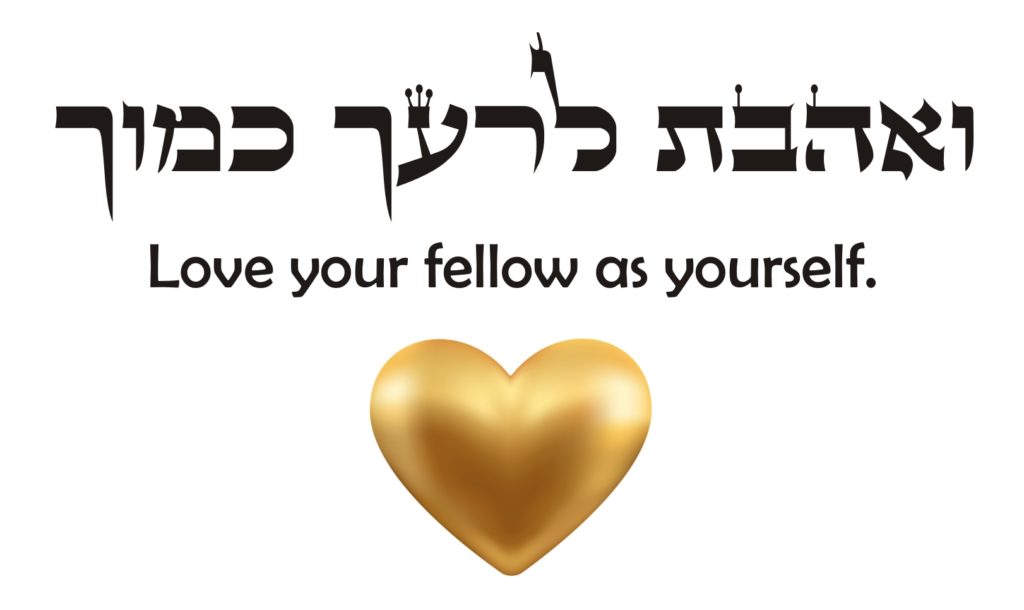In a nutshell

Acharei Mot, following the deaths of Nadav and Avihu, (Leviticus 16:1–18:30( sets forth the law of the Yom Kippur ritual, centralized offerings, blood, and sexual practices. In common years (2021, 2023, 2025, 2026, and 2028), parashah Acharei Mot is combined with the next parashah, Kedoshim, In leap years (2022, 2024, and 2027), parashah Acharei Mot is read separately. Leviticus 16, which addresses the Yom Kippur ritual, is the Torah reading for the Yom Kippur morning (Shacharit) service, and Leviticus 18 is the Torah reading for the Yom Kippur afternoon (Minchah) service.
Yom Kippur

On the day Aharon’s sons Nadav and Avihu died when they drew too close to the presence of the G-d, Mosheh was warned by G-d against unauthorized entry “into the holy.”
“Tell your brother Aaron that he is not to come at will into the Shrine behind the curtain, in front of the cover that is upon the ark, lest he die; for I appear in the cloud over the cover.” Leviticus 16:2 וַיֹּ֨אמֶר יְהוָ֜ה אֶל־מֹשֶׁ֗ה דַּבֵּר֮ אֶל־אַהֲרֹ֣ן אָחִיךָ֒ וְאַל־יָבֹ֤א בְכָל־עֵת֙ אֶל־הַקֹּ֔דֶשׁ מִבֵּ֖ית לַפָּרֹ֑כֶת
אֶל־פְּנֵ֨י הַכַּפֹּ֜רֶת אֲשֶׁ֤ר עַל־הָאָרֹן֙ וְלֹ֣א יָמ֔וּת כִּ֚י בֶּֽעָנָ֔ן אֵרָאֶ֖ה עַל־הַכַּפֹּֽרֶת׃
Entering Kodesh Hakodashim
The kodesh hakodashim was the holiest part of the Beit Hamikdash because the Shechina rested between the two poles of the aron. Only the kohen gadol (“high priest”), may enter the innermost chamber in the Sanctuary, once a year, four times on Yom Kippur, to do the Avodah:
1. The first time he offers ketoret (incense).
2. The second time he enters, he sprinkles the blood of his own bull eight times in front of the Aron.
3. The third time he enters, he sprinkles the blood of the goat that has been designated by the lot “for Hashem” eight times (the second goat should be dispatched to carry off the sins of Israel to the wilderness.)
וְנָתַ֧ן אַהֲרֹ֛ן עַל־שְׁנֵ֥י הַשְּׂעִירִ֖ם גּוֹרָל֑וֹת גּוֹרָ֤ל אֶחָד֙ לַיהוָ֔ה וְגוֹרָ֥ל אֶחָ֖ד לַעֲזָאזֵֽל׃
and he shall place lots upon the two goats, one marked for the LORD and the other marked for Azazel.
וְהִקְרִ֤יב אַהֲרֹן֙ אֶת־הַשָּׂעִ֔יר אֲשֶׁ֨ר עָלָ֥ה עָלָ֛יו הַגּוֹרָ֖ל לַיהוָ֑ה וְעָשָׂ֖הוּ חַטָּֽאת׃
Aaron shall bring forward the goat designated by lot for the LORD, which he is to offer as a sin offering;
וְהַשָּׂעִ֗יר אֲשֶׁר֩ עָלָ֨ה עָלָ֤יו הַגּוֹרָל֙ לַעֲזָאזֵ֔ל יָֽעֳמַד־חַ֛י לִפְנֵ֥י יְהוָ֖ה לְכַפֵּ֣ר עָלָ֑יו לְשַׁלַּ֥ח אֹת֛וֹ לַעֲזָאזֵ֖ל הַמִּדְבָּֽרָה׃
while the goat designated by lot for Azazel shall be left standing alive before the LORD, to make expiation with it and to send it off to the wilderness for Azazel.- Leviticus 16:8-10
4. The forth time, he returns to get the spoon and the pan that he left in the kodesh hakodashim after burning the ketoret.

Then G-d said: “This shall be to you a law for all time: In the seventh month, on the tenth day of the month, you shall practice self-denial; and you shall do no manner of work, neither the citizen nor the alien who resides among you. On this day, atonement shall be made for you to clean you of all your sins; you shall be clean before the Lord. It shall be a Sabbath of complete rest for you and you shall practice self-denial; it is a law for all time.” Leviticus 16:29-31
30 prohibitions
Parshat Acharei also warns against bringing korbanot (animal or meal offerings) anywhere but in the Holy Temple, forbids the consumption of blood, and details the laws prohibiting Giluy arayot, incest and other deviant sexual relations. The laws of incest are specific. Children shall not uncover the nakedness of their parents, nor their siblings or cousins or aunts or uncles or grandparents. Parents shall not uncover the nakedness of their children, nor their children’s children. Nakedness of in-laws and relatives shall not be uncovered.

Kedoshim
Parshat Kedoshim, holy ones, begins with the statement: “You shall be holy, for I, the L‑rd your G‑d, am holy.” This is followed by 51 ethical and ritual mitzvot (commandments) through which the Jew sanctifies him/herself and relates helping people live lives of holiness.
Some of the laws includes those recorded in the Ten Commandments, such as honor and awe of one’s parents, keeping the Sabbath and not stealing. G-d also introduces laws about farming and about belief in supernatural beings. the prohibition against idolatry, the mitzvah of charity, the principle of equality before the law, sexual morality, honesty in business, and the sacredness of life. G-d instructs Mosheh regarding the procedures for the Day of Atonement; sexual prohibitions are then listed.
“You shall not follow the practices of the nations that I am driving out of the promised land. For it is because they did all these things that I abhorred them and said to you, “You shall possess their land, for I will give it to you to possess, a land flowing with milk and honey.” Leviticus 20:24
“Love your fellow as yourself.”
Also in Kedoshim is the dictum which the great sage Rabbi Akiva called a cardinal principle of Torah, and of which Hillel said, “This is the entire Torah, the rest is commentary”-“Love your fellow as yourself.”
לֹֽא־תִקֹּ֤ם וְלֹֽא־תִטֹּר֙ אֶת־בְּנֵ֣י עַמֶּ֔ךָ וְאָֽהַבְתָּ֥ לְרֵעֲךָ֖ כָּמ֑וֹךָ אֲנִ֖י יְהוָֽה׃
You shall not take vengeance or bear a grudge against your countrymen. Love your fellow as yourself: I am the LORD. -Leviticus 19:18.
The Vilna Gaon wrote in a letter that “A great part of the Torah is concerned with a person’s
bringing happiness to others”, and you fulfill this command when you teach another Torah.
There are two verses in the Torah which display opposite emotions. One is “Thou shalt
not hate your neighbor in your heart”. The more familiar verse, famous is “Love your neighbor” as yourself. Rabbi Akiva declared that this is one of the primary rules of Torah “Zeh kelal gadol baTorah”.
Rabbi Hillel
A Gentile came to Rabbi Hillel once, demanding that he teach him the whole Torah on one foot, the principle of Torah on which to base all the rest. Rabbi Hillel gave it serious consideration. He answered the obverse of “Love your neighbor”, “That which is hateful to you, do not do to your neighbor”, that is the basis of all the Torah. The rest is commentary. Now go and learn the commentary.”
Can one love a fellow as oneself ?
“We can fulfill this commandment at every single moment of the day. We do so when we visit
the sick, when we comfort the mourner, when we help someone marry, and when you help them
rejoice at the wedding. We do so when we are hospitable to guests, and when we greet others
with a friendly attitude. In this connection, a Synagogue as a group has the same obligation of
the individual. When a guest comes into the Synagogue, we must express love of our neighbor
by making them welcome, including them in our Kiddush celebrations afterwards, and
introducing them to our friends.
You fulfill the command when you lend money to someone who needs it, when you pray for their refuah or well being, or business success, when you give a gift, when you give them good news, when you cheer them up, when you give good advice, when you write relatives letters or call them so that they should not worry about you, when you forgive others wrongs they have done to you.”- Nisson Shulman.
Easier said than done, as there are many tendencies of human nature that prevent us from loving our neighbors. The main impediment to this commandment is jealousy.
Rabbi Yonatan Eibeshutz
Rabbi Yonatan Eibeshutz posed the following problem: “When someone comes to a Rabbi with
a question concerning whether or not an animal is kosher, he will accept a reply that it is not
kosher in good spirits, even though it may result in a considerable loss. But if the same person
comes to a Rabbi for a Halakhik decision in a dispute with another person, he will be very angry
with the Rabbi for deciding against him, even when his financial loss is very small. Why the
difference? The answer is: When someone is told that his meat is not kosher, although he suffers a loss, he is willing to accept it graciously because no one else gains. But in a financial dispute, his loss is the other person’s gain, and as a result he is consumed with jealousy (Tzintzenes Hamon, p. 127).
The Baal Shem Tov
The Baal Shem Tov used to say: “Love your fellow man as yourself. You know that you have
many faults, nevertheless you still love yourself. That is how you should feel towards your
fellow man. Despite his faults, love him.” (Likutei Avraham, p.221). May we all love one another as we love ourselves.
The five kinds of korbanot-review
OLAH– The “ascending offering” that is wholly raised to G‑d by the fire atop the altar; MINCHAH– Five varieties of “meal offering” prepared with fine flour, olive oil and frankincense; SHELMIM– The “peace offering”, whose meat was eaten by the one bringing the offering, after parts are burned on the altar and parts are given to the kohanim (priests); cattle, sheep, and goats. CHATAT– The different types of “sin offering” brought to atone for transgressions committed by mistake either by the High Priest, the entire community, the king or the ordinary people. ASHAM– The “guilt offering” brought by one who has misappropriated property of the Sanctuary, who is in doubt as to whether he transgressed a divine prohibition, or who has committed a “betrayal against G‑d” by swearing falsely to defraud a fellow man.

30 Mitzvot in Parashat Acharei Mot
- A Kohen must not enter the Temple indiscriminately Lev. 16:2
- To follow the procedure of Yom Kippur in the sequence prescribed in Parshah Acharei Mot (“”After the death of Aaron’s sons…””) Lev. 16:3
- To afflict yourself on Yom Kippur Lev. 16:29
- Not to slaughter sacrifices outside the courtyard Lev. 17:4
- To cover the blood (of a slaughtered beast or fowl) with earth Lev. 17:13
- Not to make pleasurable (sexual) contact with any forbidden woman Lev. 18:6
- Not to have sexual relations with your mother Lev. 18:7
- Not to have homosexual sexual relations with your father Lev. 18:7
- Not to have sexual relations with your father’s wife Lev. 18:8
- Not to have sexual relations with your sister Lev. 18:9
- Not to have sexual relations with your son’s daughter Lev. 18:10
- Not to have sexual relations with your daughter Lev. 18:10
- Not to have sexual relations with your daughter’s daughter Lev. 18:10
- Not to have sexual relations with your father’s wife’s daughter Lev. 18:11
- Not to have sexual relations with your father’s sister Lev. 18:12
- Not to have sexual relations with your mother’s sister Lev. 18:13
- Not to have sexual relations with your father’s brother’s wife Lev. 18:14
- Not to have homosexual sexual relations with your father’s brother Lev. 18:14
- Not to have sexual relations with your son’s wife Lev. 18:15
- Not to have sexual relations with your brother’s wife Lev. 18:16
- Not to have sexual relations with a woman and her daughter Lev. 18:17
- Not to have sexual relations with a woman and her son’s daughter Lev. 18:17
- Not to have sexual relations with a woman and her daughter’s daughter Lev. 18:17
- Not to have sexual relations with your wife’s sister Lev. 18:18
- Not to have sexual relations with a menstrually impure woman Lev. 18:19
- Not to have sexual relations with someone else’s wife Lev. 18:20
- Not to pass your children through the fire to Molech Lev. 18:21
- Not to have homosexual sexual relations among men Lev. 18:22
- A man must not have sexual relations with an animal Lev. 18:23
- A woman must not have sexual relations with an animal Lev. 18:23
51 Mitzvot in Parashat Kedoshim
- Fear your father or mother Lev. 19:3
- Not to inquire into idolatry Lev. 19:4
- Not to make an idol for others Lev. 19:4
- Not to eat from that which was left over Lev. 19:8
- Not to reap that corner Lev. 19:9
- To leave gleanings Lev. 19:9
- Not to gather the gleanings Lev. 19:9
- To leave a corner of the field uncut for the poor Lev. 19:10
- To leave the gleanings of a vineyard Lev. 19:10
- Not to gather the gleanings of a vineyard Lev. 19:10
- To leave the unformed clusters of grapes Lev. 19:10
- Not to pick the unformed clusters of grapes Lev. 19:10
- Not to deny possession of something entrusted to you Lev. 19:11
- Not to swear in denial of a monetary claim Lev. 19:11
- Not to steal money stealthily Lev. 19:11
- Not to swear falsely in God’s Name Lev. 19:12
- Not to rob openly Lev. 19:13
- Not to withhold wages or fail to repay a debt Lev. 19:13
- Not to delay payment of wages past the agreed time Lev. 19:13
- Not to put a stumbling block before a blind man (nor give harmful advice) Lev. 19:14
- Not to curse any upstanding Jew Lev. 19:14
- A judge must not have mercy on the poor man at the trial Lev. 19:15
- A judge must not respect the great man at the trial Lev. 19:15
- A judge must not pervert justice Lev. 19:15
- Judge righteously Lev. 19:15
- Not to speak derogatorily of others Lev. 19:16
- Not to stand idly by if someone’s life is in danger Lev. 19:16
- Not to hate fellow Jews Lev. 19:17
- To reprove a sinner Lev. 19:17
- Not to embarrass others Lev. 19:17
- To love other Jews Lev. 19:18
- Not to take revenge Lev. 19:18
- Not to bear a grudge Lev. 19:18
- Not to plant diverse seeds together Lev. 19:19
- Not to crossbreed animals Lev. 19:19
- Not to eat fruit of a tree during its first three years Lev. 19:23
- The fourth year crops must be totally for holy purposes like Ma’aser Sheni Lev. 19:24
- Not to be superstitious Lev. 19:26
- Not to engage in astrology Lev. 19:26
- Men must not shave the hair off the sides of their head Lev. 19:27
- Men must not shave their beards with a razor Lev. 19:27
- Not to tattoo the skin Lev. 19:28
- To show reverence to the Temple Lev. 19:30
- Not to perform ov (medium) Lev. 19:31
- Not to perform yidoni (“”magical seer””) Lev. 19:31
- To honor those who teach and know Torah Lev. 19:32
- Not to commit injustice with scales and weights Lev. 19:35
- Each individual must ensure that his scales and weights are accurate Lev. 19:36
- The courts must carry out the death penalty of strangulation Lev. 20:10
- The courts must carry out the death penalty of burning Lev. 20:14
- Not to imitate them in customs and clothing Lev. 20:23
The 613 Mitzvot
In The Torah there are 613 commandments, mitzvot, also known as the Law of Moses (תרי״ג מצוות, taryag mitzvot). The 613 mitzvot are first recorded in the 3rd century CE, when Rabbi Simlai mentioned it in a sermon that is recorded in Talmud Makkot 23b.
The 613 commandments include 248 “positive commandments”, to perform an act (mitzvot aseh), and 365 “negative commandments”, to abstain from certain acts (mitzvot lo taaseh). The negative commandments number 365, which coincides with the number of days in the solar year, and the positive commandments number 248, a number ascribed to the number of bones and main organs in the human body.
Though the number 613 is mentioned in the Talmud, its real significance increased in later medieval rabbinic literature, including many works listing or arranged by the mitzvot. The most famous of these was an enumeration of the 613 commandments by Maimonides, The Rambam.
Many of the mitzvot cannot be observed now, following the destruction of the Second Temple, although they still retain religious significance. According to one standard reckoning, there are 77 positive and 194 negative commandments that can be observed today, of which there are 26 commands that apply only within the Land of Israel. Furthermore, there are some time-related commandments from which women are exempt (examples include shofar, sukkah, lulav, tzitzit and tefillin). Some depend on the special status of a person in Judaism (such as kohanim), while others apply only to men or only to women.
according to Rambam Organized by Parshah. based on Wikipedia and http://www.vaadrv.org/rambam613mitzvot.asp ONE BIG IMPORTANT NOTE WHEN USING THIS LISTING: This listing is not all inclusive. Rambam may site multiple sources for a mitzvah is his works but this list currently only gives one source for each mitzvah.

Check out YedidYah Psalm 96 “Yiram Hayam” Music by Rabbi Yakira Yedidia https://youtu.be/aTBD4i9nvXw
The Priestly Blessing
יְבָרֶכְךָ יהוה, וְיִשְׁמְרֶךָ- May the LORD bless you and guard you
יָאֵר יהוה פָּנָיו אֵלֶיךָ, וִיחֻנֶּךָּ -May the LORD make His face shed light upon you and be gracious unto you
יִשָּׂא יהוה פָּנָיו אֵלֶיךָ, וְיָשֵׂם לְךָ שָׁלוֹם- May the LORD lift up His face unto you and give you peace
Check out YedidYah “The Priestly Blessing” Birkat Hakohanim. Music by Rabbi Yakira Yedidia https://youtu.be/YNE11QdEMN0

This blog article was inspired by chabbad.org, Sefaria.org, Wikipedia.org
